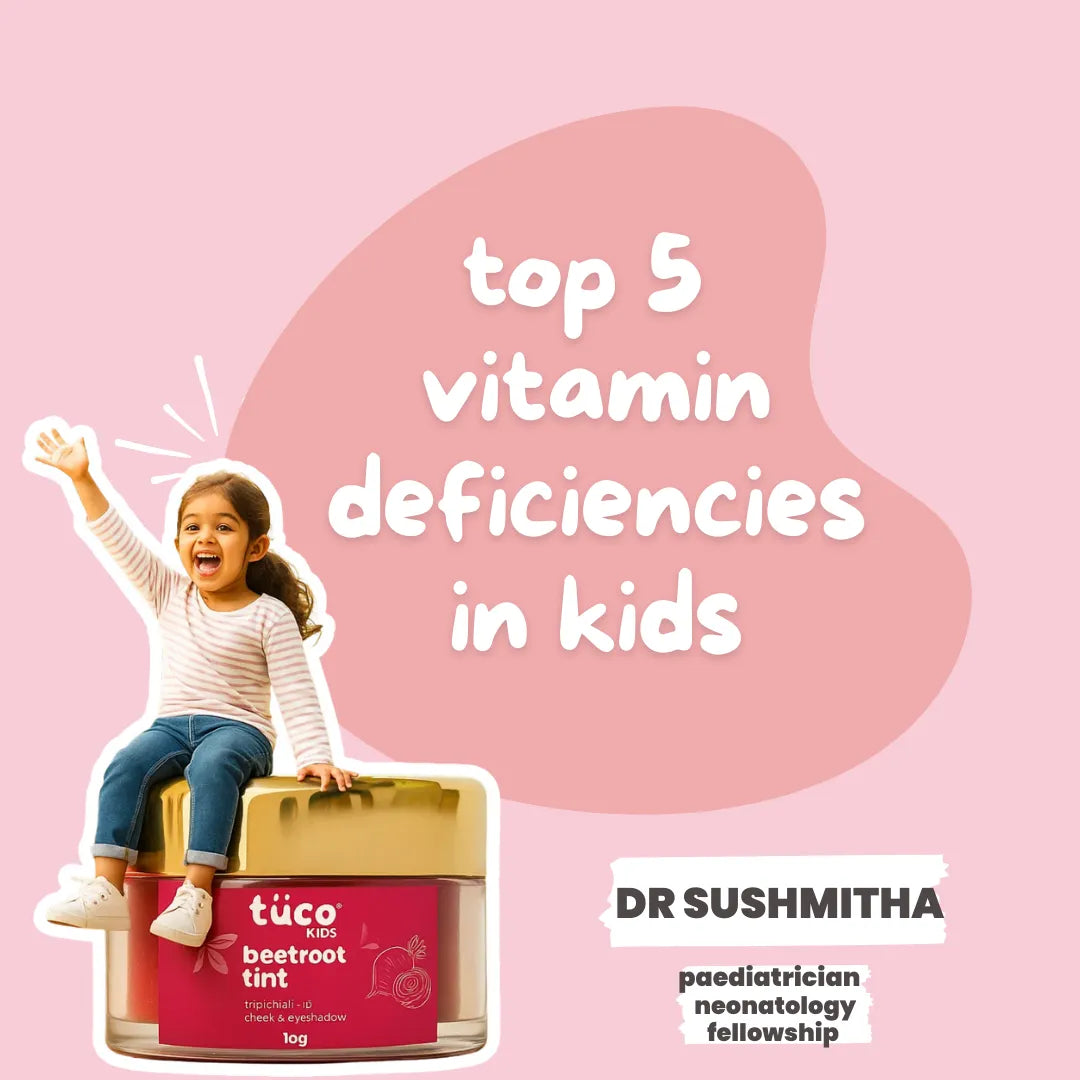
Top 5 Nutritional Deficiencies in Kids & How to Fix Them Naturally – Backed by Science
By Dr. Sushmitha (DNB Pediatrics, Fellowship in Neonatology, NHS UK | Certified in Functional Medicine)
As parents, we want our children to grow up healthy, strong, and full of energy. But even with the best intentions, kids can develop nutritional deficiencies that affect their growth, immunity, and development. With today’s fast-paced lifestyle, picky eating habits, and heavily processed foods, these gaps are more common than we think.
Dr. Sushmitha, a pediatrician with global clinical experience and a special interest in functional medicine, shares the most common nutritional deficiencies in children today—and simple, natural solutions to fix them.
Common causes: Diets low in iron, too much cow’s milk consumption (especially for kids younger than 2 years), blood loss ( including heavy menstrual bleeding), and certain gastrointestinal conditions that interfere with absorption.
Signs: Lack of energy or tiring easily, pale skin, low appetite, poor concentration or eating inedible items (Pica).
Fix it Naturally:
- Add iron-rich foods like spinach, lentils, pumpkin seeds, green leafy vegetables and dates.
- Pair them with Vitamin C (like orange or amla) to boost absorption.
- Avoid any caffeinated drinks
“If your child is tired all the time despite getting enough sleep, consult your doctor to check for iron deficiency. It’s one of the easiest deficiencies to miss.”
Common causes: Indoor lifestyle with limited sun exposure is the most common cause. Less commonly certain medication conditions and medications can also lead to low Vitamin-D levels.
Signs: Bone pains, delayed walking, frequent infections, falls and fractures, irritability.
Fix it Naturally:
- Encourage 15–20 minutes of morning sunlight daily.
- Encourage outdoor play.
- Include Vitamin-D rich foods in your regular diet like mushrooms and egg yolks.
“Vitamin D is crucial not just for bones but also for mood and immunity. Supplementation may be necessary after testing.”
3. Calcium Deficiency
Common causes: Diet lacking calcium like dairy products and green leafy veggies, Vitamin D deficiency as it is essential for calcium absorption. Certain medical conditions can also cause low calcium levels
Signs: Dental abnormalities like poor enamel development, delayed tooth emergence, muscle weakness, dry skin, brittle nails, irritability and mood swings.
Fix it Naturally:
-
Include calcium rich foods such as dairy products, sesame seeds, ragi (finger millet), leafy greens, and almonds in regular diet.
Combine with Vitamin D for better absorption. -
Consult your paediatrician for supplements if required
4. Vitamin B12 Deficiency
Common causes: Pure vegetarian or vegan diets as it lacks this essential vitamin and certain malabsorption conditions.
Signs: Muscle Weakness, numbness, mood swings, delayed milestones.
Fix it Naturally:
- Dietary changes
- Oral supplementation - consult your paediatrician
“B12 is vital for neurological development. Don’t ignore subtle signs like tingling hands or sudden behavioural changes.”
5. Zinc Deficiency
Common causes: Poor soil quality, picky eating, or low-protein diets.
Signs: Slow wound healing, frequent colds, poor appetite, hair thinning.
Fix it Naturally:
- Include pumpkin seeds, chickpeas, cashews, and whole grains.
- Rotate in more legumes and nuts for variety.
Preventive Paediatric Nutrition Tips from Dr. Sushmitha:
✅ Follow a rainbow plate – include different colors fruits and veggies daily.
✅ Prioritize whole, unprocessed foods.
✅ Avoid nutrient blockers like excess sugar and junk food.
✅ Regular check-ups and growth tracking help catch gaps early.
✅ Involve kids in cooking and shopping – it boosts interest in food.
Childhood is the foundation for lifelong health. By identifying and correcting nutritional deficiencies early, we can give our kids the best chance at growing up strong, happy, and thriving.

